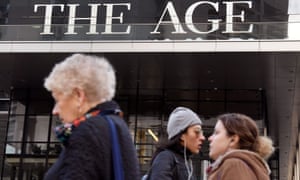Exclusive: in a letter to Nine executives, close to 70 journalists
say pressure is being put on reporters to ‘produce certain angles’ and
masthead is in danger
Close to 70 journalists from the Age have expressed their “alarm” over what they say is the increasing politicisation of the Melbourne newspaper under executive editor James Chessell.
In a letter to Chessell, and fellow Nine executives chief digital and publishing officer Chris Janz and Age editor Alex Lavelle, the journalists said they were worried about maintaining the “proud reputation and independence” of the paper because editors were putting pressure on reporters “to produce particular angles”.
The Age staff say the masthead is in danger of becoming a “subsidiary of Sydney” because it is being edited by Sydney, without regard for the Victorian readership and values. They want Lavelle to be given back full control to edit from Melbourne.
“We believe there is a growing public perception that we have become politicised, a perception that is damaging the reputation of The Age and, potentially, the viability of the business,” they wrote.
“Politicisation undermines Nine’s commitment to editorial independence, and hurts The Age masthead, beneath which appear the words “Independent. Always.”
The trigger for the letter was a lead story “Activists ‘planning
trouble’ at Protest” on Friday 5 June which claimed activists had
threatened police with physical abuse ahead of the match.In a letter to Chessell, and fellow Nine executives chief digital and publishing officer Chris Janz and Age editor Alex Lavelle, the journalists said they were worried about maintaining the “proud reputation and independence” of the paper because editors were putting pressure on reporters “to produce particular angles”.
The Age staff say the masthead is in danger of becoming a “subsidiary of Sydney” because it is being edited by Sydney, without regard for the Victorian readership and values. They want Lavelle to be given back full control to edit from Melbourne.
“We believe there is a growing public perception that we have become politicised, a perception that is damaging the reputation of The Age and, potentially, the viability of the business,” they wrote.
“Politicisation undermines Nine’s commitment to editorial independence, and hurts The Age masthead, beneath which appear the words “Independent. Always.”
But the allegation was not backed up by anyone in the story, and the Age corrected it later in the day and apologised.
“The story fell short of The Age’s editorial values and standards and caused understandable offence to many members of the community,” the apology said.
“The claim that activists had threatened police with spitting and abuse was not backed up beyond one unnamed source. The story put undue emphasis on these claims. The main organisers of the rally, the Warriors of the Aboriginal Resistance, clearly stated that they had no knowledge of any threats to police.”
Staff were also concerned by an editorial which said “Australia does not have a legacy of slavery”. The paper took nine days to correct the editorial. The correction was published the day after Chessell received the letter from staff.
Asked on Friday why they took over a week to correct the editorial, Chessell told Guardian Australia: “We should have corrected it earlier.”
When Nine took over Fairfax Media in late 2018 chief executive, Hugh Marks, said he wants Fairfax Media’s mastheads to retain their independence because that is what allows them to produce quality journalism.
The concern from journalists at the Age, which is shared by many on the Sydney Morning Herald, predates Nine’s takeover.
“As independent journalists we do not favour any political position, party or ideology,” they wrote. “Our job is to find facts, make sense of them and explain them to our readers. We believe stories should be assessed on their journalistic merit.”
Staff have long feared the paper may be moving more to the right.
“We write to you about recent events and trends that we believe pose a threat to The Age’s proud reputation and independence,” they wrote.
“We are concerned that key editorial decisions are being made on a regular basis from Sydney, rather than by local editors with a better understanding of our readers, our city and our state.
“We want to make it very clear we do not seek to single out individual journalists for criticism. Our concerns are about the system and culture in which we work.
“As journalists we have watched with alarm as changes have been made in editorial approach. Our concerns include, but are not limited to:
- Pressure on reporters to produce particular angles on stories
- A story on the Black Lives Matter protest that required an apology, and an ill-informed editorial that said Australia “does not have a legacy of slavery”
- Errors being inserted into reporters’ copy during the editing process
- A failure to understand the values and interests of our Victorian readership
“Sadly, our newsroom does not reflect the diverse and multicultural state in which we live and work,” they wrote. “As far as we are aware The Age has had only one Indigenous reporter in its 166 year history. Every editor in the Age’s history has been a white man, as is every current foreign correspondent.
“We ask that an Indigenous affairs reporting role be created in Melbourne. We also ask that a greater effort be made to hire and promote people from culturally diverse backgrounds.”
The journalists say the award-winning exposure of corruption and government, corporate, bank and union misconduct can “only flourish when we are free to work independently”.
Chessell has been contacted for comment.

No comments:
Post a Comment